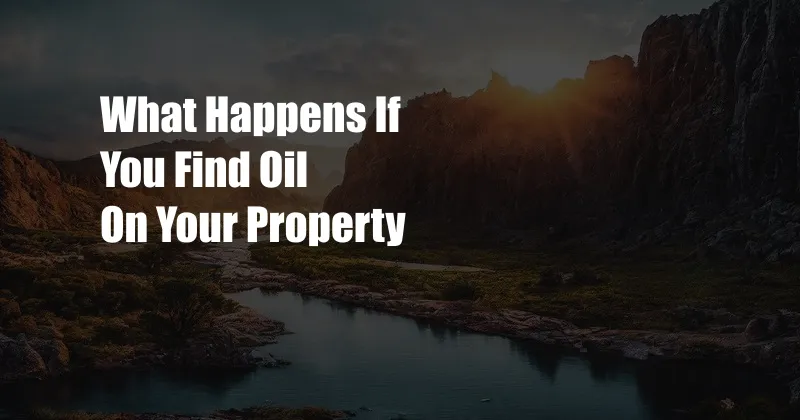
What Happens if You Find Oil on Your Property?
Imagine the thrill of discovering a potential oil well on your land! While it’s a scenario straight out of a dream, it may leave you wondering about the next steps and the implications of such a fortune. To help you navigate this potentially life-changing event, let’s delve into the world of oil discovery and its consequences.
Legal Considerations: Rights and Responsibilities
Striking oil on your property comes with a range of legal implications. It is essential to understand your rights and responsibilities as a landowner in relation to oil and mineral rights. In most jurisdictions, the ownership of subsurface minerals, including oil, is separate from the ownership of the surface land. This means that even if you own the surface of the property, the mineral rights may belong to someone else.
If the mineral rights belong to you, you have the legal right to extract and sell the oil. However, you will need to obtain the necessary permits and licenses from relevant authorities. Additionally, you may be required to pay royalties to the government and any other parties with interests in the mineral rights.
Negotiating Leases and Contracts
If you do not own the mineral rights, you can still benefit from an oil discovery on your property. Most landowners enter into lease agreements with oil companies who have the expertise and resources to extract and sell the oil. These agreements typically involve the payment of royalties to the landowner, based on the amount of oil produced.
Negotiating a lease agreement is crucial. Seek professional advice from an attorney and industry experts to ensure you understand the terms and conditions and receive fair compensation for your property and mineral rights.
Environmental Impact and Mitigation
Oil extraction can have significant environmental implications. It is important to consider the potential impacts on the land, air, and water resources in the surrounding area. Ensure that the oil company you partner with has a comprehensive environmental management plan in place to minimize the ecological footprint of their operations.
Community and Economic Impacts
An oil discovery can have far-reaching impacts on the surrounding community. It can create jobs, stimulate economic growth, and lead to increased tax revenues for local governments. However, it is crucial to manage these developments responsibly, addressing potential issues such as population growth, traffic congestion, and housing shortages. Community engagement and transparent communication are vital for ensuring that the benefits of oil extraction are shared equitably.
Expert Advice and Tips
-
Secure Legal Representation: Engage an attorney specializing in oil and gas law to protect your rights and guide you through the legal process.
-
Due Diligence: Research different oil companies and their environmental practices before signing a lease agreement.
-
Negotiate Favorable Terms: Seek fair royalties and ensure you have clear rights regarding access, land use, and environmental monitoring.
-
Monitor Oil Production: Regularly track the amount of oil extracted and ensure that you are receiving the agreed-upon royalties.
-
Be Patient: Oil extraction is a long-term process. Stay informed, engage with experts, and make informed decisions throughout the journey.
Frequently Asked Questions
Q: What are the first steps I should take if I find oil on my property?
A: Confirm the discovery through a geological survey, consult an attorney, and explore your legal options for extracting or leasing the oil rights.
Q: Who owns the mineral rights to my property?
A: Mineral rights may belong to the surface landowner, a previous owner, or a third party. Check your property deeds and consult with an attorney to determine ownership.
Q: What are the environmental risks associated with oil extraction?
A: Potential risks include land contamination, water pollution, air emissions, and noise. Ensure that the oil company implements effective environmental mitigation measures.
Q: How can I benefit from an oil discovery on my property without owning the mineral rights?
A: You can negotiate a lease agreement with an oil company, granting them the rights to extract oil in exchange for royalties and other benefits.
Conclusion
Discovering oil on your property can be a transformative event. By understanding your legal rights, negotiating favorable contracts, and addressing environmental and community concerns, you can harness this opportunity to create wealth, support your community, and leave a positive legacy for generations to come.
Are you interested in learning more about the topic? Join our online forum or connect with us on social media to engage in discussions, ask questions, and stay abreast of the latest developments in oil extraction and its implications.